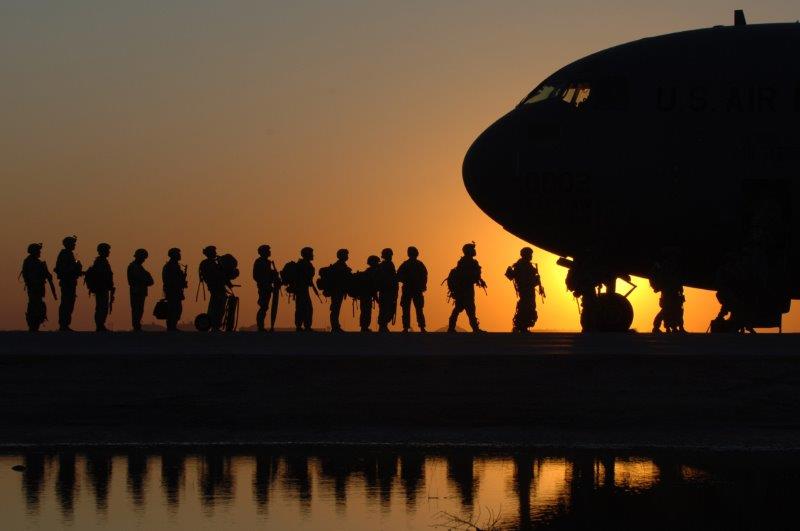Navigating the waters of romance with a partner in the military can often leave one adrift in a sea of uncertainty. Studies indicate that military couples face higher rates of infidelity compared to civilian counterparts, owing largely to unique occupational strains.
So, are military guys faithful? This article will delve into why some military men might find staying faithful a challenge and offer strategies for maintaining trust within these relationships. Stay with us as we explore this sensitive terrain together.
Key Takeaways
- Military relationships face unique tests like long deployments and limited communication, which can strain emotional intimacy and trust.
- Situations such as the high - pressure military environment and frequent exposure to different cultures may impact a service member's ability to stay faithful.
- Stress, anxiety, alcohol and substance use, along with fear of commitment due to the unpredictable nature of military life are factors that can affect faithfulness in military men.
- Open communication, setting clear boundaries, and encouraging healthy coping mechanisms are vital strategies for maintaining trust and fidelity in military relationships.
- Despite challenges inherent to the military lifestyle, strong relationships are built on honesty, support, understanding each other’s needs, and resilience.
Understanding the Challenges Military Relationships Face
Understanding the Challenges Military Relationships Face: Military relationships are uniquely tested by circumstances most civilian relationships never encounter. The strain of long periods apart and the stress inherent in military life create a complex backdrop for romantic partnerships, demanding exceptional resilience from both parties involved.

Long Deployments
Long deployments separate military personnel from their loved ones for months, sometimes over a year. This lengthy time apart creates immense challenges in maintaining emotional intimacy and companionship.
Spouses at home often grapple with feelings of loneliness and insecurity, while those deployed may experience stress and anxiety due to the high demands of military life. Keeping love and trust alive requires more than just resilience; it calls for constant effort to bridge the distance through whatever means possible.
Without regular body language cues or physical intimacy, couples must find innovative ways to express emotions and provide social support. They rely on letters, emails, phone calls, and occasional video chats to share thoughts, desires, and daily experiences.
These coping methods become crucial lifelines that sustain relationships against the backdrop of separation. Transitioning now into discussing limited communication reveals even further how these partners navigate their long-distance relationship hurdles.
Limited Communication
Military relationships often grapple with the hurdle of limited communication, making it harder to sustain the connection that is vital for trust and faithfulness. Deployments can lead to gaps in sharing daily experiences and emotional support which are critical for a healthy relationship.
Partners may feel isolated, leading to restlessness or jealousy as they fill in the blanks with their own worries.
Communication challenges don't just stem from distance but also from the high-security nature of military operations. Service members might be unable to disclose their locations or discuss details about their missions, adding layers of mystery and potential misunderstandings.
The lack of regular updates can strain mental well-being, leaving room for doubt on both sides. Couples must find creative ways to stay connected within these constraints, relying on brief messages or scheduled calls when possible to bridge the gap caused by time zones and demanding duties.
Maintaining a relationship under such conditions requires patience and strong coping mechanisms; without them, partners may struggle with feelings of disconnect that threaten relationship stability.
In absence of traditional forms of contact like phone calls or texts, couples craft alternative paths for connection through letters or care packages—tangible proofs of love sent across miles that reinforce bonds during long periods apart.
Did You Know: Research suggests military couples may experience higher rates of infidelity than their civilian counterparts, with unique occupational strains such as long deployments and the stress of military life cited as significant factors?
High-Pressure Environment
Limited communication often amplifies the stress of a high-pressure environment that military personnel routinely face. This pressure cooker setting can ratchet up emotional tensions and strain personal relationships.
Daily workouts, relentless drills, unexpected missions, and the shadow of danger contribute to an atmosphere where one must always remain alert and ready for action. Soldiers deal with the constant risk while their partners back home cope with uncertainty and fear.
Professionals in uniform are trained to handle traumatic experiences that would unnerve most civilians; yet even the strongest minds need outlets for stress relief. Such extreme conditions can lead to seeking comfort in ways that might not align with commitments made back home.
Choices are made quickly, sometimes under peer pressure or as an attempt at fleeting pleasure—decisions that carry weighty consequences for all involved parties.
Why Military Men May Not Always Be Faithful
The question of fidelity among military men is a complex one, fraught with unique pressures and circumstances that can challenge even the strongest of commitments. Factors such as the isolating "deployment mentality" and the allure of new cultures may contribute to choices that deviate from their promises back home.

The “Deployment Mentality”
Military life comes with its unique set of mindsets, and the "deployment mentality" is one that both service members and their spouses know all too well. It's a state of mind where the reality of being away from loved ones for extended periods can lead to feelings of isolation and disconnection.
For some military men, this might normalize putting normal life on pause, including the commitments they've made to relationships back home.
Despite training for resilience, soldiers may seek temporary escapes or coping strategies that don't align with their values when at home base. These choices could involve flirtation or more serious breaches of trust.
In contrast, spouses often grapple with intuition telling them something is off but lack hard evidence due to distance and sporadic communication. This dynamic complicates trust-building efforts needed in forging strong bonds within military marriages.
Exposure to Different Cultures
Living a life adjacent to the military means being part of a world that's always changing, sometimes in unexpected ways. For service members, this often includes exposure to various cultures and customs that can expand one's worldview.
Encounters with diverse values and social norms provide an opportunity for growth but might also present challenges within committed relationships.
Understanding these cultural influences is essential for those dating or married to military personnel. It allows couples to discuss experiences openly and learn from them together, rather than allowing them to create distance or misunderstanding.
Respect for different lifestyles and perspectives aids in strengthening bonds between partners, despite the complications of prolonged separations and dynamic social environments on deployments or postings abroad.
| Group | Infidelity Rate | Additional Info |
|---|---|---|
| Active duty military men | 30% | One study found 30% of active duty men admitted to cheating on a partner |
| Active duty military women | 19% | 19% of active duty women admitted infidelity in the same study |
| Military men on long deployments | Up to 38% | Rates of cheating increased to as high as 38% for military men on lengthy deployments abroad |
| Military spouses during partner's deployment | 15% | 15% of military spouses at home reported they were unfaithful during a partner's deployment |
| Civilian men | 20-25% | Various estimates place cheating rates for civilian men in the 20-25% range on average |
| Civilian women | 10-15% | Research shows civilian women have lower infidelity rates around 10-15% typically |
Repeated Separations
Military life isn't just about adapting to different cultures; it also involves enduring frequent and prolonged separations. Military men often find themselves pulled away from their families for months on end, a reality that strains even the strongest of bonds.
The absence can create emotional gaps where loneliness festers, urging some to seek companionship in ways that may not align with their commitments back home.
These ongoing partings test trust and can lead military guys to feel disconnected from their civilian lives. Friendships and new relationships might spring up as coping mechanisms to fill the void left by spouses or partners who are miles away.
This distance becomes more than geographical—it's emotional, sometimes leading individuals down paths they wouldn't otherwise choose if not for the isolating circumstances of repeated separations.
Factors That Can Impact Faithfulness in Military Men
Military life brings unique strains, and factors such as the psychological toll of stress, the lure of substance use, and hesitancy toward long-term commitments can sometimes undermine faithfulness; unraveling these influences requires a deep dive into the less-discussed aspects of military romance.

Stress and Anxiety
Stress and anxiety are common experiences for those who have partners in the military. The unpredictable nature of military life, combined with frequent deployments, can create a heavy emotional toll.
This strain may tempt some service members to seek comfort in ways that jeopardize relationship trust. High levels of stress can impair judgment and lead to choices that might not be made under normal circumstances.
Managing these emotions is critical for maintaining faithfulness. It's vital that both partners find effective stress management techniques to support each other. Encouraging your spouse to talk about their feelings or seek therapy can help alleviate the pressure they face daily.
Meanwhile, focusing on your own mental health by building a support system among other military spouses could provide an outlet for shared concerns and fears, strengthening resilience against the challenges of military life.
Alcohol and Substance Use
Coping with stress and anxiety often leads individuals to seek relief in various ways, and unfortunately, this sometimes includes turning to alcohol and substances. Within the military community, the availability of these items combined with the unique pressures faced by service members can result in increased use as a means to manage emotional or psychological pain.
This behavior not only jeopardizes their health but also has far-reaching implications on their relationships, sometimes contributing to unfaithfulness.
Military men may find that alcohol and substance use temporarily numbs feelings of loneliness or disconnection during deployments. However, these temporary fixes can lead to impaired judgment, compromising their ability to remain faithful.
It is crucial for both military personnel and their spouses to be aware of these risks; having transparent conversations about coping strategies is key. Instead of leaning on harmful habits, it's important for those serving our country—and those who love them—to promote resilience through healthier outlets that support physical well-being and emotional fidelity.
Did You Know: Studies on military families reveal a substantial increase in substance use and mental health issues among service members facing repeated deployments, factors that are strongly linked to relationship strain and increased risk of infidelity?
Fear of Commitment
Fear of commitment in military relationships often goes beyond just not wanting to settle down. Military men may encounter unique psychological pressures that make them cautious about forming deep, lasting bonds.
The transient nature of their careers can provoke a hesitation to commit, as they face the reality that any relationship could undergo strain with each new assignment or deployment.
For some service members, the concern is about protecting their loved ones from the challenges and dangers inherent in military life. They might avoid making long-term plans or showing vulnerability, which can come across as fear of commitment but stems from a desire to shield others from potential heartache.
This defense mechanism becomes even more pronounced when dealing with high-stakes situations where every decision could have serious consequences - creating an underlying resistance to forging commitments that feel impossible to assure in such an unpredictable lifestyle.
Effective Strategies for Trust and Faithfulness in Military Relationships
Fostering trust and ensuring faithfulness in military relationships requires a tailored approach, considering the unique pressures faced by service members. Let's explore the key strategies that can fortify these bonds despite the challenges.

Maintaining Open Communication
Keeping an open line of communication is crucial in military relationships. Partners can bridge the physical distance by sharing their daily experiences, feelings, and concerns. Regular phone calls, emails, and messages help nurture that vital connection.
It's about being honest with each other about the struggles and triumphs you both face.
Open communication builds trust and a stronger bond between couples. Military spouses may need to talk through fears or hesitations without worry of judgment or dismissal. For those serving away from home, voicing worries and stresses openly ensures they don't carry the weight alone.
Clear expression of needs and expectations from both sides helps prevent misunderstandings that could harm the relationship.
Establishing Clear Boundaries
Setting solid boundaries is key for couples navigating the complexities of dating a military man. Clear limits help both partners understand what's acceptable and what's not, fostering mutual respect and trust.
It might involve agreeing on how often to communicate during deployments or setting expectations about behaviors with other women in the military or civilians.
Boundaries protect relationships from misunderstandings that could lead to issues like infidelity, which can be more challenging when one partner is away for extended periods. Partners should discuss these guidelines openly before separations occur, ensuring both are on the same page.
This process requires honesty from each person about their needs and comfort levels.
After you've laid down clear boundaries, it’s important to look at how you support each other emotionally. The next step involves encouraging healthy coping mechanisms that build confidence rather than turning towards harmful behaviors such as substance use.
Encouraging Healthy Coping Mechanisms
Once clear boundaries are in place, fostering healthy coping strategies becomes the next critical step. Military life can hurl curveballs that lead to stress and anxiety, making it vital for those in relationships with military personnel to have robust mechanisms for handling pressure.
Practicing mindfulness or deep-breathing exercises can be powerful tools for managing emotions and maintaining mental well-being. Engaging in regular physical activity is also beneficial as it releases endorphins which naturally elevate mood and combat stress.
Creating a support network of friends, family, or fellow military spouses offers another layer of emotional assurance. Sharing thoughts and concerns within this circle provides relief from internal struggles while contributing to a sense of community.
Moreover, seeking professional counseling when necessary should never be viewed as a sign of weakness but rather as an informed step towards resilience and health. It's essential to recognize early signs of distress and address them proactively with appropriate coping techniques – this approach not only supports individual well-being but reinforces the stability needed in military relationships.
Conclusion: Are Military Guys Faithful?
In facing the reality of military life, faithfulness can waver under unique pressures. It's crucial to acknowledge that fidelity is not solely a military issue; trust is a universal relationship cornerstone.
Strong bonds weather storms with honest dialogue and mutual support. Ultimately, each individual holds the power to commit to loyalty, regardless of their uniform. Let's empower relationships with understanding and resilience in this journey together.
FAQs
1. What are some reasons people question the faithfulness of military guys?
Some folks worry about long periods away from home and high-stress situations affecting military guys' relationships, which can lead to doubts about their faithfulness.
2. Is there a higher rate of infidelity in the military than in other professions?
Reports vary and it's tough to say for sure, but what we know is that being in the military comes with unique challenges that can test any relationship.
3. Do stories of infidelity involving military personnel get more attention?
Yes, when these stories hit the news, they often focus heavily on the drama involved due to the high stakes and intense nature of military life.
4. How can couples maintain a faithful relationship when one partner is deployed?
Keeping open lines of communication, setting clear expectations, and building trust are key steps for staying connected and faithful during deployments.
5. Do military boyfriends cheat more when they're stationed overseas for long periods of time?
Yes, the combination of distance, limited communication, and high-stress environments can strain military relationships and affect faithfulness.
6. My boyfriend is in the military and got deployed to Afghanistan. Should I be worried he might be unfaithful while he's overseas?
It's understandable to have worries, but avoiding assumptions and maintaining trust is important during deployments to maintain fidelity in military relationships.
7. If my military girlfriend cheats while she's stationed far away, is it just because of the distance or are there other factors?
There are many complex reasons military personnel may struggle with faithfulness like stress, isolation, substance use or cultural factors, not just physical separation from their partner.











